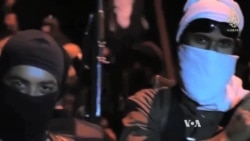A court in Belgium on Wednesday handed jail sentences to 45 members of an Islamist group called Sharia4Belgium, convicted of arranging for young men to travel to Syria to fight for jihadist groups.
The case was the latest in a series of prosecutions of European citizens who have joined terror groups in Syria. Most of those sentenced in Antwerp, however, were absent from court, presumed to be fighting or to have been killed in Syria.
The group's leader, Fouad Belkacem, was given a 12-year term.
The son of Dimitri Bontinck was given a suspended sentence after agreeing to be a witness for the prosecution. Bontinck, who traveled to Syria in 2013 to try to bring back his son, Jejoen, criticized the decision to give long jail sentences to young people he described as "brainwashed."
He said that the young people were being criminalized and therefore would never return. Such treatment was creating more fertile ground for terrorists and more hatred of the West, he said.
Foreign fighters are often featured in Islamic State propaganda and recruiting videos. Officials said about 350 Belgians have traveled to fight in Syria, the highest number in Europe relative to population. An estimated 4,000 Europeans have joined Islamist militant groups.
Several countries, including Britain, France and Spain, are debating removing the passports and citizenship of those convicted of traveling to join terror groups. Security services are pushing for more powers of surveillance. It is a delicate balance, said Sajjan Gohel of the Asia-Pacific Foundation in London.
“The authorities do need to have the tools to be able to stop it," he said. "But whether those [laws] that are being proposed by various European and Western countries can be implemented remains to be seen, because human rights and civil liberties will come into it.”
Steve Crawshaw of the human rights group Amnesty International said the proposals to try to tackle foreign fighters could be counterproductive "because they introduce a level of restriction without really addressing the actual crimes that have been committed. What we need is laws to deal with crimes, and the criminal code is already there to deal with that. We do not want to broaden that out indefinitely. That is a very wrong way to go.”
The West must tackle the propaganda to dissuade impressionable young Muslims from joining Islamic State, Gohel said.
“They need to see that this group kills more Muslims than they kill anybody else," he said. "That is something the West needs to convey far more than it’s doing.”
Kurdish fighters celebrated the successful defense of the town of Kobani, Syria, last month. Backed by U.S.-led coalition airstrikes, the Kurds prevented Islamic State from taking the town. The defeat could help change the perception of invincibility among potential foreign fighters, Gohel said.
“They poured fighters into Kobani, took a lot of hits, a lot of resources were utilized. But they were not able to take the town," he said. "Symbolically, it has been a very important defeat for the group. But equally, what they have tried to do to mask it is show videos of the hostages that they have taken.”
Washington confirmed this week that Islamic State’s last U.S. hostage, aid worker Kayla Mueller, had been killed, though it was not clear how. Analysts said the group now holds just a handful of Western hostages.





